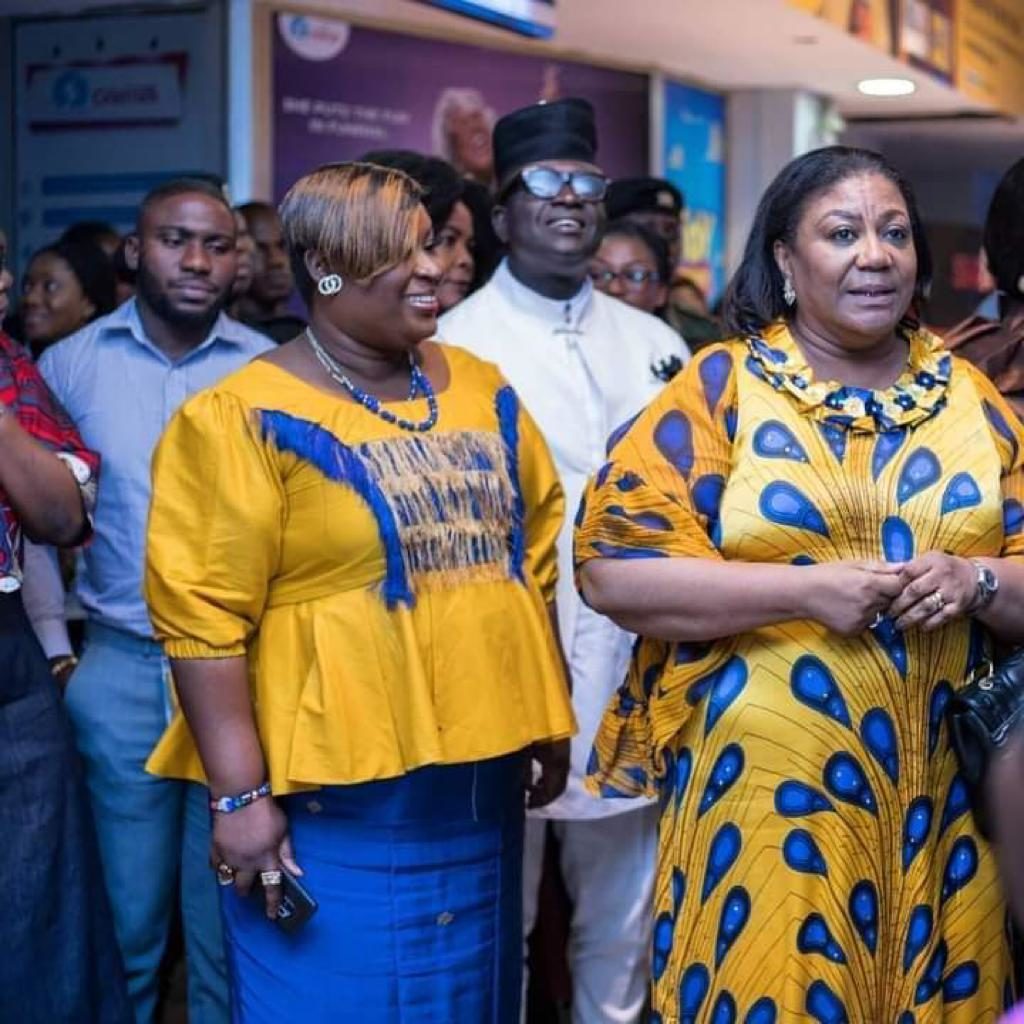
Clubhouse Ghana Mental Health Rehabilitation!
Introducing Clubhouse Ghana
Mission Statement
To rehabilitate people living with Mental Health conditions in Ghana through advocacy, skills training, as well as helping them access Free Basic Education and Health Care.
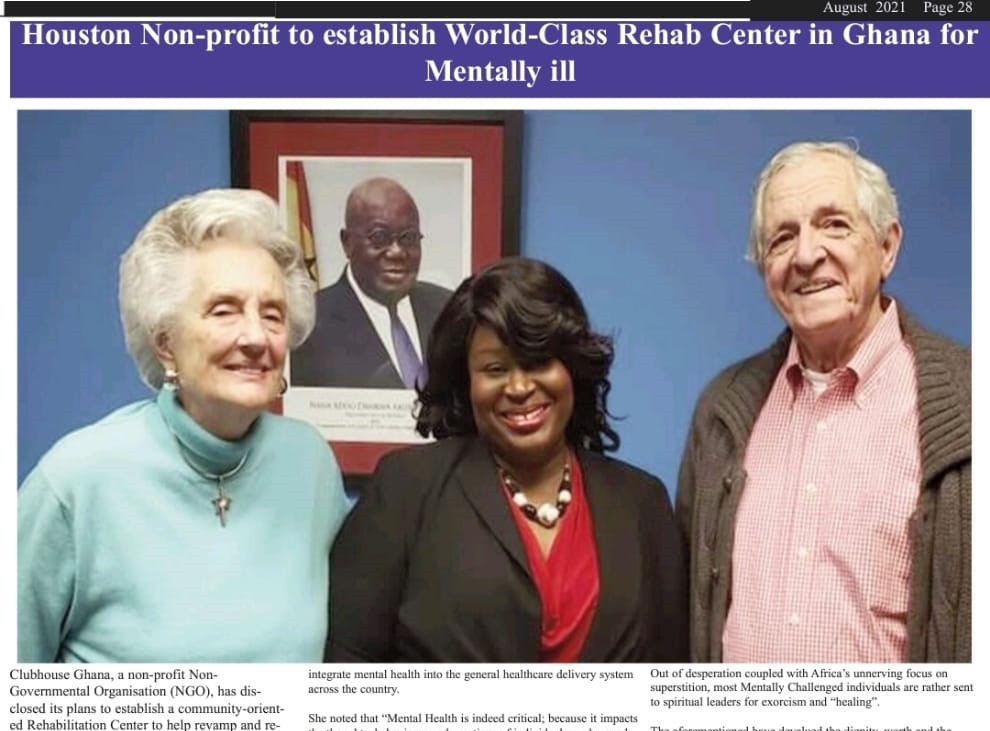
An outline of the proposed project, and how it fits into the wider strategic plan
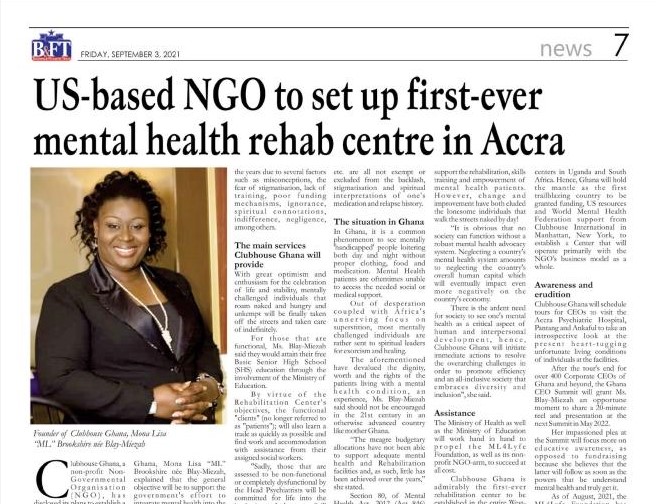
Background
Clubhouse Ghana, a non-profit Non-Governmental Organization (NGO), intends to establish a community-oriented rehabilitation center to help revamp and re-integrate mental healthcare delivery into the fabric of society.
The center, when completed next year, will open its doors to former patients / clients; and provide them with skills in carpentry, farming, cooking, bartending, masonry, plumbing, as well as other trades (if necessary); in order for them to be self-sufficient when they recover from a mental condition in any local psychiatric hospital.
Through these activities, the recovering individuals will gain an inner sense of self-pride, resilience and tenacity to function and also have the capacity to face life’s challenges devoid of family and community neglect due to the stigma attached to mental health and the shrouded influence in its wake!
Clubhouse Ghana is admirably the First-Ever Clubhouse-Franchised Rehabilitation Center to be established in the entire West-African region. There are only two other Clubhouse-Franchised Rehabilitation Centers in Uganda and South Africa. Hence, Ghana will hold the mantle as the first trailblazing country to be granted funding, US resources and World Federation of Mental Health support from Clubhouse International in Manhattan, New York etc. to establish a Center that will operate primarily with the NGO’s business model as a whole
Project objective
The general objective of the project is to make mental healthcare affordable and more cost effective as a means of supporting the government’s effort to integrate mental health into the general healthcare delivery system across the country.
Project justification / Current situation in Ghana
Mental Health is indeed critical, because it impacts the thoughts, behaviors and emotions of individuals; and as such, has a direct impact on one’s actions and inactions as well as one’s sense of judgment and self-worth. Additionally, mental health has socio-economic implications for the patients, their families and the nation as a whole since it contributes significantly to productivity and the human resource base of any country in Africa or the world at large.
According to the World Health Organization (WHO), about 13 percent of Ghanaians are ‘mentally challenged’. However, the issue has not really been given the needed attention over the years due to several factors such as misconceptions, the fear of stigmatization, lack of training, poor funding mechanisms, ignorance, spiritual connotations, indifference, negligence, among others.
In Ghana, it is a common phenomenon to see mentally ‘handicapped’ people loitering both day and night without proper clothing, food and medication. Mental Health patients are oftentimes unable to access the needed social or medical support. Out of desperation coupled with Africa’s unnerving focus on superstition, most mentally challenged individuals are rather sent to spiritual leaders for exorcism and healing which should not be encouraged in the 21st century in an otherwise potentially advanced country like Ghana.
“The meagre budgetary allocations have not been able to support adequate Mental Health and Rehabilitation facilities and, as such, little has been achieved over the years,” Section 80, of Mental Health Act, 2012 (Act 846) talks about the establishment of a Mental Health Fund which will, among other things, support the rehabilitation, skills training and empowerment of Mental Health patients. However, change and improvement have both eluded the lonesome individuals that walk the streets naked by day!
“It is obvious that no society can function without a robust mental health advocacy system. Neglecting a country’s mental health system amounts to neglecting the country’s overall human capital which will eventually impact even more negatively on the country’s economy.
There is the ardent need for society to see one’s mental health as a critical aspect of human and interpersonal development, hence, Clubhouse Ghana will initiate immediate actions to resolve the overarching challenges in order to promote efficiency and an all-inclusive society that embraces diversity and inclusion”.
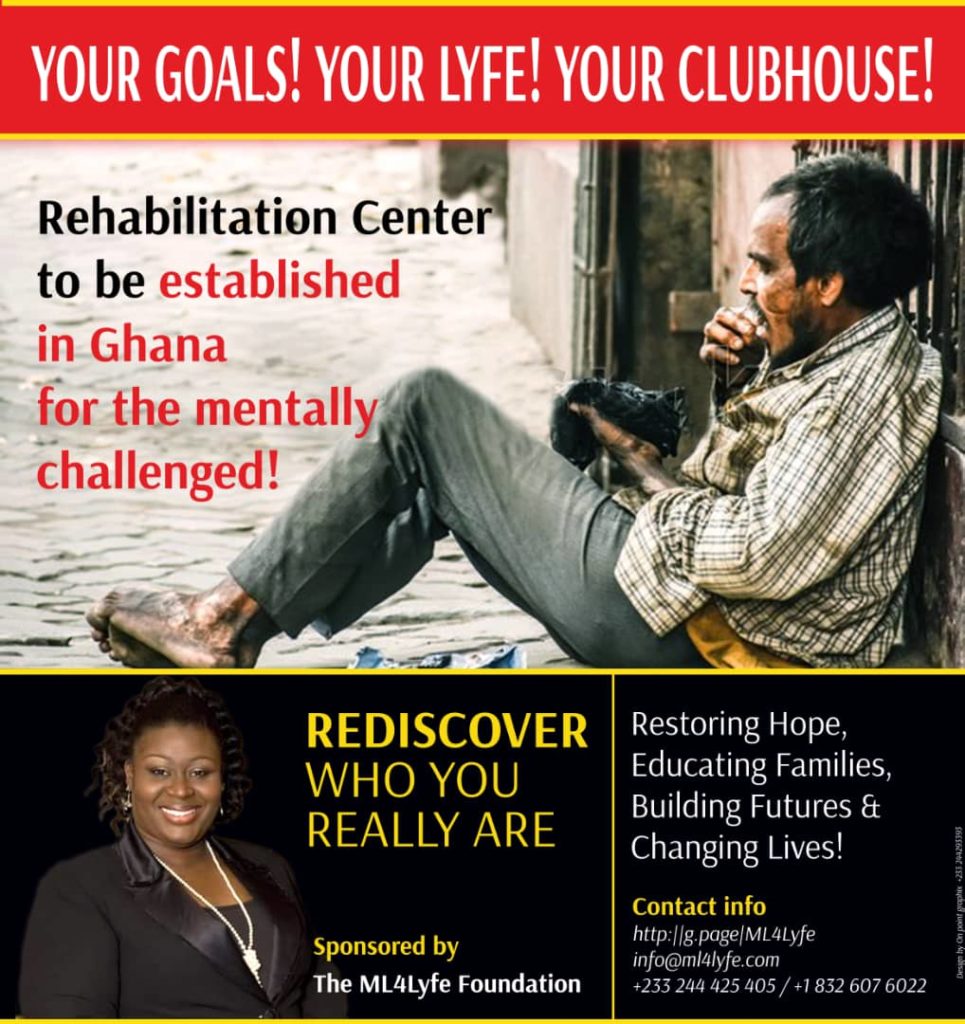
Access to medical care and social support systems
Access to proper medical care for Mental Health patients has been a challenge and the inadequate budgetary allocation by the central governments over the years seem not to change in the near future, due to Ghana’s weak economic status. There are only three dedicated Mental Health hospitals in the country which are serving over 30.8 million people. According to Ghana’s Mental Health Authority report, only 2 percent of the Mental Health patients are able to access medical care. The cost of treatment is also a major barrier for individuals to access medication and treatment. Again, the mental health patients do not have adequate social support system that augment their medication to facilitate their recovery and integration. As such, a lot of the mental health patients do not go for treatment, whilst others discontinue or default in medical care.
The main services Clubhouse Ghana will provide
- For those that are functional, the project will ensure their free Basic Senior High School (SHS) education through the involvement of the Ministry of Education.
- By virtue of the Rehabilitation Center’s objectives, the functional “members” (no longer referred to as “patients”); will also learn a trade as quickly as possible and find work and shelter with assistance from their assigned social workers.
- Those that are assessed to be non-functional or completely dysfunctional by the Head Psychiatrists will be taken care of till they expire one day”.
- Medical services will be rolled into a specific healthcare insurance plan. Duly, from the provisions of international funding, no challenged client will ever be turned away or rejected through the involvement of the Ministry of Health.
- Clubhouse Ghana will also serve as a Recreational Center for members. The Center will facilitate sporting and entertainment activities amongst the members while individual talents and activities, such as music and acting will be harnessed as a means for the individuals to earn a living.
- Upon request, counseling and psychotherapy services will also be provided to members. This will be done with the assistance of Social Workers in Ghana as well as The Ghana Psychological Counsel.
Partnerships / Affiliates
The Ministry of Health, Rotary Club of Accra Industrial (RCAI); as well as the Ministry of Education will work hand in hand to propel ML4Lyfe Group’s non-profit NGO-arm, to succeed at all cost.
Project Benefits
- Restoration of fundamental human rights and reduced inequalities SDG 10
- Contribution to GDP and decent work SDG 8
- Reduction in Ghana’s illiteracy rate SDG 4
- Promotion of good health and well-being SDG 3
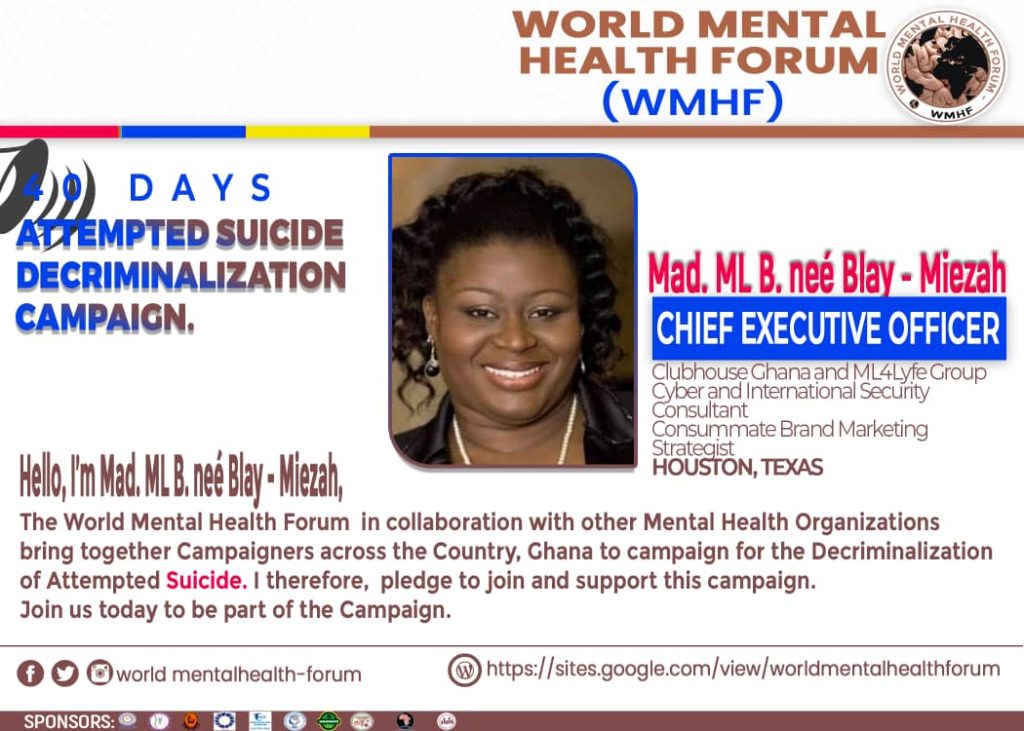
Awareness and Erudition
Clubhouse Ghana will schedule tours for CEOs to visit the Accra Psychiatric Hospital, Pantang and Ankaful to take an introspective look at the present heart-tugging unfortunate living conditions of individuals at the facilities.
After the tour’s end for over 400 Corporate CEOs of Ghana and beyond, the Ghana CEO Summit will grant the CEO and Founder, Madam Brookshire an opportune moment to share a 20-minute reel and presentation at the next Summit in May 2022 (even though their organization is NOT in partnership with Clubhouse Ghana or in any way affiliated). The CEO and Founder will simply be granted an opportunity to be one of many Speakers for the esteemed event. Her impassioned plea at the Summit will focus more on educative awareness as opposed to fundraising because Clubhouse Ghana believes that the latter will follow as soon as the powers that be understand Mental Health and its nuances.
Timeline
- Sign MOU Agreement with Ministry of Health
- Sign MOU Agreement with Ministry of Education
- Launch Foundation on 26th December 2021
- 4-pronged Fundraising initiatives will be implemented
- Survey and Land permit developments
- Infrastructure and Design identified by Architects
- Budgetary constraints identified
- Finalize costs and contracts for technology solutions
- Dedicate management resources to support the project
- 20-minute presentation at the non-affiliated Ghana CEO Summit
- Database adapted to receive data directly from Clubhouses on its indicators
- Clubhouse Remote Portal system designed and developed
- Accra Psychiatric Hospital recovered patients become Members
- Pantang new members identified
- Ankaful new members assessed
- Private hospitals with private Mental Health recovered patients identified
- Building of Clubhouse Ghana Ongoing
- Building of Clubhouse finalized
- Reflect the aggregate impact and importance of person-centered work and member rights based on the services needed to improve personal outcomes
- Clubhouse admits first recovered Members that were identified from July ‘22
- Clubhouse Inauguration on 26th December 2022: Boxing Day virtually: Zoom
Addendum: A fundraising plan, including a list of other actual/potential funders and the status of each request
Clubhouse Ghana……………
4-Pronged approach to Fundraising:
1st: International Donors and Fundraising activities outside of Ghana
2nd: Media Fundraising and Nationalistic Campaign spearheaded by StarrFM Radio Station
3rd: Ghana Corporates as it relates to Corporate Social Responsibility
4th: GoFundMe Portal to raise funds across the globe after the Foundation Launch: http://www.gofundme.com/ML4LyfeFoundation
Hence, Clubhouse Ghana is trying to secure funding and has been able to raise several thousands of dollars from the GoFundMe portal ahead of time and prior to the official Launch of the Foundation slated for Sunday, 26th December 2021 virtually on Zoom, both locally and internationally. This proposal is being submitted to your esteemed organization for the balance of the costs required for implementing the full program as detailed above.
Parent Company

483 Tenth Avenue, Suite 205, New York, NY 10018 USA. 212.582.0343 info@clubhouse-intl.org
About
A brief history and key achievements for Clubhouse International
Clubhouse International was established in 1994, as a global non-profit organization dedicated to creating recovery opportunities for people living with mental illness. The organization grows and sustains a robust network of Clubhouses around the world that offer a proven program model of psychosocial rehabilitation and community integration. Clubhouse International’s membership represents more than 325 Clubhouses in more than 30 countries on six continents. Each year, almost 100,000 people living with mental illness access Clubhouse services.
WHAT IS A CLUBHOUSE?
A Clubhouse is a facility that encourages and supports people living with mental illness to ensure their recovery. It’s a welcoming place where community and acceptance are the norm. With this (Clubhouse) concept, people who come to a Clubhouse are not considered as patients, or clients, rather they are members with unreliable rights who are engaged in the daily operations in the Clubhouse by taking critical decisions that promotes their well-being in order to function. Working alongside others who have a mental illness, members are encouraged to invest in and leverage their personal strengths and, over time, this aids tremendously with their recovery and overall sense of purpose, acceptance and well-being in an out-patient facility that can include housing services in the long-run through Social Welfare intervention.
Achievements
- Better employment results: Longer on-the-job tenure is found to be highly correlated with Clubhouse attendance. Studies have shown that the Clubhouse model results in longer job tenure (median of 199 vs. 98 days) and higher earnings (median of $3,456 vs. $1,252) than other mental health programs. Source: Macias, C., Rodican, C. F., Hargreaves, W. A., Jones, D. R., Barreira, P. J., & Wang, Q. (2006), Supported employment outcomes of a randomized controlled trial of ACT and Clubhouse models, Psychiatric Services, 57(10), 1406-1415; and Schonebaum, A. D., Boyd, J. K., & Dudek, K. J. (2006), A comparison of competitive employment outcomes for the Clubhouse and PACT models, Psychiatric Services, 57(10), 1416-1420.
- Reduced hospital stays: Clubhouse membership has been shown to cut the number of hospitalizations by one-third and the average number of hospital days per year by 70%. Source: Di Masso, J., Avi-Itzhak, T., Obler, D.R. (2001), The clubhouse model: An outcome study on attendance, work attainment and status, and hospitalization recidivism, Work, 17(1):23-30.
- Reduced incarcerations during and after Clubhouse membership, thus cutting incarceration costs between $20,000-$65,000 per inmate per year. Source: Johnson, J. and Hickey, S. (1999), Arrests and incarcerations after psychosocial program involvement: Clubhouse vs. Jailhouse, Psychiatric Rehabilitation Journal, 23, 66-69.
- Better physical and mental health: A recent study suggests that service systems like Clubhouses that offer ongoing social supports enhance mental and physical health by reducing disconnectedness. Source: Leff, H.S., McPartland, J.C., Banks, S. et al. Mental Health Services Research (2004) 6: 93.
- Cost effectiveness: The annual cost of Clubhouses is estimated to be one-third of the annual cost of the Individual Place and Support (IPS) model with Vocational Rehab Centers. Source: McKay, Colleen & Yates, Brian & Johnsen, Matthew. (2007). Costs of Clubhouses: An International Perspective. Administration and policy in mental health. 34. 62-72.
SPECIAL AWARDS
Additionally, in 2014 Clubhouse International was the co-recipient of the prestigious Conrad N. Hilton Humanitarian Prize, presented to nonprofit organizations judged to have made extraordinary contributions toward alleviating human suffering.
STANDARD OPERATING PROCEDURES
Clubhouses are successful because of the development of and adherence to critical Standards. The program criteria and methodology used at all Clubhouses is established by the International Standards for Clubhouse Program which defines the Clubhouse Model of psychosocial rehabilitation and are consensually agreed upon by the worldwide Clubhouse community. The International Standards for Clubhouse Programs (Standards) are the ‘Best Practices’ and values declaration of the Clubhouse model. They are updated through a transparent and participatory process every two years. Clubhouse International’s training curriculum and accreditation programs are anchored in the International Standards for Clubhouse Programs.
An overview of the forward strategy and key objectives
- Internationally accepted best practice standards
- Accessible and consistently high-quality training programs
- Ongoing quality assurance through accreditation

Summary
- Simplified and user-friendly data collection processes
- Training delivery capability
- Volunteer, i.e., faculty, support
- Accreditation process support
Your support, advocacy and donation will greatly enhance the efforts that we are presently conducting to establish the First-Ever Clubhouse-Franchised Rehabilitation Center in Ghana.
Thank you very much.
www.gofundme.com/ML4LyfeFoundation
Yours in Service,
Clubhouse Ghana Team
+1 832 607 6022
UPCOMING EVENT
An overview of the forward strategy and key objectives
To rehabilitate people living with Mental Health conditions in Ghana through advocacy, skills training, as well as helping them access Free Basic Education and Health Care.
Meet Connell Thompson on his Sax virtually on Sunday, December, 26th 2021 from 6pm to 8pm GMT or 1pm to 3pm EST
Inbox +1 832 607 6022 if you’d like to join the Zoom whilst the supporting celebrities drop by to say hi.
There will also be a surprise guest that will join to show support for all corporate endeavors under the ML4Lyfe Brand.
See you there or be square and join DJ Capelo and KKD as MC for the illustrious event.
All You Need To Know About Clubhouse Ghana
Clubhouse Ghana’s Rewarding FundRaising Partnership With TV AFRICA-GHANA

